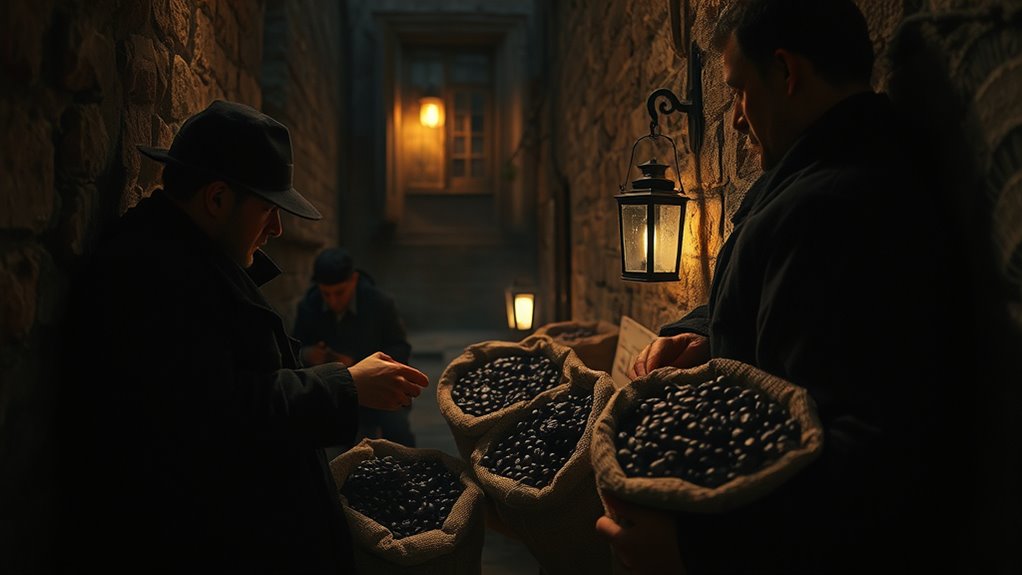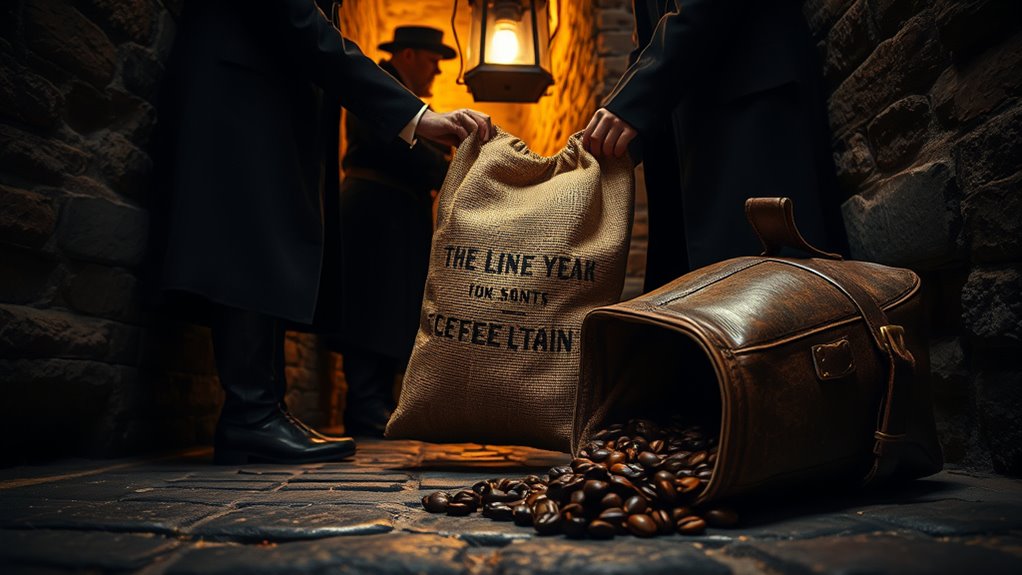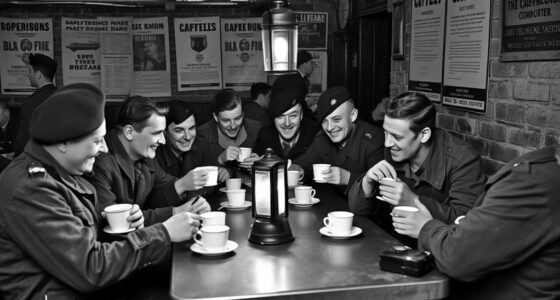You can see that smuggling coffee beans played a key role in spreading coffee across the world through secret missions. Traders and growers often bypassed strict trade restrictions and taxes by using hidden compartments, falsified documents, and covert shipping routes. These clandestine efforts kept coffee’s journey alive despite laws and bans. If you want to explore how these secret missions shaped coffee’s global presence, the story gets even more intriguing.
Key Takeaways
- Early coffee spread involved clandestine transport of beans across borders to avoid trade restrictions.
- Smugglers used hidden compartments and false documents to secretly move coffee beans to new regions.
- Secret missions often aimed to establish coffee cultivation in forbidden or restricted areas.
- Historical trade bans prompted covert operations to introduce coffee to untapped markets.
- Modern illegal transportation techniques continue the tradition of smuggling coffee beans through covert methods.

Coffee smuggling has become a covert operation for those seeking to bypass strict regulations and high tariffs. You might not realize it, but behind the scenes, individuals and groups have long engaged in secret missions to move coffee across borders. This clandestine activity isn’t just about avoiding taxes; it’s deeply rooted in the history of coffee cultivation and the historical trade routes that once connected continents. Coffee’s journey from its origins in Ethiopia to the coffee-growing regions of Central and South America was driven by traders enthusiastic to establish new markets and bypass local restrictions. Over time, as governments imposed tariffs and controlled the flow of beans, some saw the value in smuggling as a way to access lucrative markets without paying hefty duties. This pattern continues today, with modern smugglers deploying clever methods to hide their shipments, using hidden compartments or falsified documents, all in an effort to stay ahead of authorities. The ongoing demand for coffee continues to fuel these secretive operations, despite efforts to curb illegal trade.
The historical trade of coffee played an essential role in shaping these secretive operations. When coffee first spread beyond Ethiopia, it traveled along trade routes like the Arabian Peninsula, through the port of Mocha, and eventually across European markets. Traders and merchants often faced restrictions, taxes, or outright bans in certain regions, prompting them to develop discreet ways of transporting coffee beans. These early smuggling efforts set the stage for a tradition that persists. Today, you’ll find smugglers leveraging advanced technology, like encrypted communications and covert shipping networks, but the core motivation remains the same: to profit from coffee’s growing global demand while avoiding regulations. Understanding the roots of trade restrictions helps shed light on why coffee smuggling endures even in the face of modern enforcement efforts. Additionally, the global demand for coffee continues to motivate these illicit activities, making enforcement a constant challenge.
Frequently Asked Questions
Which Countries Were Most Involved in Coffee Smuggling?
You might wonder which countries were most involved in coffee clandestine activities. Historically, nations like Brazil, Colombia, and Ethiopia played key roles in coffee smuggling routes, often to preserve their local coffee industries or explore new markets. These countries actively engaged in smuggling routes, clandestinely moving beans to avoid tariffs or restrictions. Their efforts helped spread coffee globally, shaping the rich coffee culture we enjoy today.
How Did Smuggling Affect Local Coffee Farmers?
You might notice that smuggling impacts coffee farmers by creating an illegal trade that undermines their efforts. When coffee is smuggled, local farmers often struggle to compete with illegal imports, which can lower prices and reduce their income. This illicit trade also discourages investment in local coffee industries and can lead to instability in the community, making it harder for honest farmers to thrive and sustain their livelihoods.
Were There Any Famous Spies Linked to Coffee Smuggling?
You might find it fascinating that some famous spies used espionage tactics and covert operations to smuggle coffee beans. While specific names aren’t widely known, historical accounts suggest that spies during colonial times played a role in secret missions to protect or acquire valuable coffee sources. These covert operations helped spread coffee across regions, influencing global trade and fueling the intrigue surrounding espionage in the coffee industry.
What Techniques Were Used to Hide Coffee Shipments?
You learn that smugglers used concealed containers to hide coffee shipments, making them hard to detect. They also relied on covert routes, such as hidden passages or discreet transportation methods, to move coffee secretly across borders. By combining these techniques, you can understand how smugglers protected their valuable cargo from authorities, ensuring coffee’s clandestine journey remained undetected and contributing to its widespread popularity.
How Did Smuggling Influence Global Coffee Trade Regulations?
You see, smuggling substantially impacted global coffee trade regulations by highlighting the risks of contraband trade and illegal circulation. As authorities struggled to control unauthorized shipments, they implemented stricter laws and enforcement measures. This shift aimed to prevent illegal circulation, protect legitimate trade, and regulate coffee distribution globally. Your awareness of these changes underscores how clandestine activities shaped modern regulations, making the coffee industry more secure and transparent over time.
Conclusion
So, next time you sip your coffee, remember it’s more than just a morning boost—it’s a story of daring secret missions and smuggling efforts that planted the seeds of your favorite brew. The journey of coffee is like a hidden river, winding through history, carried by those willing to take risks. Your cup is a small window into a world of clandestine adventures, making every sip a toast to the daring souls behind its journey.









